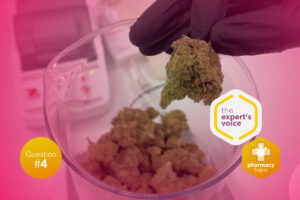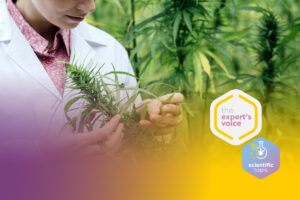Antimicrobial resistance (AMR) poses a significant threat to both human and animal health, demanding innovative solutions to combat infectious diseases effectively. In the realm of veterinary medicine, where antimicrobial agents are routinely employed, the emergence of resistant pathogens has amplified the need for alternative therapeutic options. Cannabis-derived terpenes, known for their diverse biological activities, are increasingly gaining attention for their antimicrobial properties. Our aim is to explore the potential of cannabis-derived terpenes as a novel avenue to address antimicrobial resistance in veterinary treatments.
Terpenes are aromatic compounds found abundantly in various plants, including cannabis (Cannabis sativa). These compounds are responsible for the characteristic flavors and aromas associated with cannabis strains. Moreover, terpenes exhibit a wide range of biological activities, including antimicrobial, anti-inflammatory, and antioxidant properties.
Antimicrobial Potency of Cannabis-Derived Terpenes
Several studies have demonstrated the antimicrobial efficacy of cannabis-derived terpenes against a spectrum of pathogens. The antimicrobial properties of cannabis can be attributed to its rich phytochemical profile, which includes cannabinoids, terpenes, and phenolic compounds. Among these constituents, cannabinoids such as cannabidiol (CBD) and tetrahydrocannabinol (THC) have garnered significant attention for their antimicrobial effects. Several studies reported that CBD has gram-positive activity against Staphylococcus aureus, Staphylococcus Peumoniae and Clostridioides difficile. Also a Gram-negative activity has been reported against Neisseria gonorrhoea.
The antimicrobial activity of different Cannabis Sativa extracts was reported against Bacillus subtilis and Staphylococcus aureus, Escherichia coli and Pseudomonas aeruginosa.
The antimicrobial mechanisms of Cannabis sativa are multifaceted and complex. Cannabinoids exert their antimicrobial effects through various mechanisms, including:
- Disruption of microbial membranes: Cannabinoids have been shown to destabilize bacterial and fungal cell membranes, leading to leakage of cellular contents and eventual cell death.
- Inhibition of microbial enzymes: Certain cannabinoids exhibit inhibitory effects on key microbial enzymes, disrupting essential metabolic processes vital for microbial survival and replication.
- Modulation of immune responses: Cannabinoids possess immunomodulatory properties, which can enhance the host immune response against microbial infections.
- Synergistic interactions: Cannabis compounds may act synergistically with conventional antimicrobial agents, potentiating their efficacy and overcoming microbial resistance mechanisms.
Application in Veterinary Treatments
In veterinary medicine, where bacterial infections in companion animals, livestock, and poultry are prevalent, the search for effective antimicrobial agents is ongoing. Cannabis-derived terpenes offer a promising alternative due to their broad-spectrum antimicrobial activity and relatively low toxicity compared to traditional antibiotics. Additionally, terpenes may exert synergistic effects when used in combination with existing antimicrobial drugs, potentially enhancing their efficacy while reducing the risk of resistance development.
Challenges and Considerations:
Despite their potential, several challenges must be addressed before cannabis-derived terpenes can be widely adopted in veterinary treatments. Regulatory hurdles, standardization of terpene formulations, and establishing appropriate dosing regimens are crucial considerations. Furthermore, research focusing on safety profiles, pharmacokinetics, and long-term effects of terpene-based therapies in animals is imperative to ensure their efficacy and safety.
What are the Future Perspectives?
As the understanding of cannabis-derived terpenes’ pharmacological properties continues to expand, their integration into veterinary medicine holds immense promise. Collaborative efforts between researchers, veterinarians, and regulatory agencies are essential to navigate the regulatory landscape and establish evidence-based guidelines for their use. Moreover, leveraging advances in formulation technologies can enhance the bioavailability and therapeutic efficacy of terpene-based antimicrobial treatments.
We can conclude that in the face of escalating antimicrobial resistance, exploring innovative strategies to combat infectious diseases in veterinary medicine is imperative. Cannabis-derived terpenes, with their potent antimicrobial properties and favourable safety profiles, represent a compelling avenue for addressing this challenge. By harnessing the therapeutic potential of terpenes, veterinary practitioners can expand their arsenal of antimicrobial agents, ensuring effective treatment options for a diverse range of microbial infections in animals while mitigating the risks associated with antimicrobial resistance
BIBLIOGRAPHY
Blaskovich, M.A.T., Kavanagh, A.M., Elliott, A.G. et al. The antimicrobial potential of cannabidiol. Commun Biol 4, 7 (2021). https://doi.org/10.1038/s42003-020-01530-y
E. Ali, A. Almagboul, S. Khogali and U. Gergeir, “Antimicrobial Activity of Cannabis sativa L.,” Chinese Medicine, Vol. 3 No. 1, 2012, pp. 61-64. doi: 10.4236/cm.2012.31010.
Schofs L, Sparo MD, Sánchez Bruni SF. The antimicrobial effect behind Cannabis sativa. Pharmacol Res Perspect. 2021 Apr;9(2):e00761. doi: 10.1002/prp2.761. PMID: 33822478; PMCID: PMC8023331.
Fuentes Giselle, Iglesias Azucena, Orallo Dalila, Fangio Florencia, Ramos Facundo, Mitton Giulia, Fuselli Sandra, Matias Maggi, Cristina L. Ramirez, Antibacterial activity of cannabis (Cannabis sativa L.) female inflorescence and root extract against Paenibacillus larvae, causal agent of American foulbrood, Biocatalysis and Agricultural Biotechnology, Volume 47, 2023, 102575, ISSN 1878-8181, https://doi.org/10.1016/j.bcab.2022.102575.
Luz-Veiga, M.; Amorim, M.; Pinto-Ribeiro, I.; Oliveira, A.L.S.; Silva, S.; Pimentel, L.L.; Rodríguez-Alcalá, L.M.; Madureira, R.; Pintado, M.; Azevedo-Silva, J.; et al. Cannabidiol and Cannabigerol Exert Antimicrobial Activity without Compromising Skin Microbiota. Int. J. Mol. Sci. 2023, 24, 2389. https://doi.org/10.3390/ijms24032389





